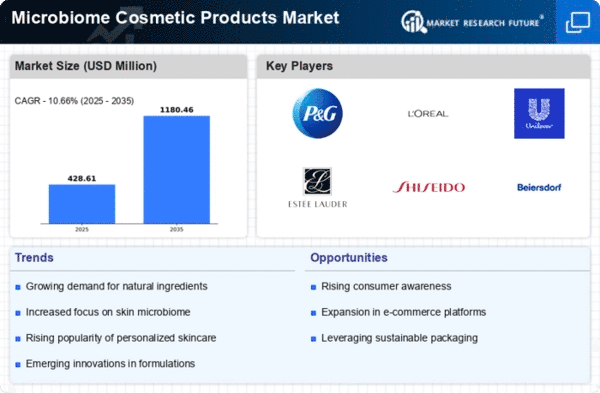Top Industry Leaders in the Microbiome Cosmetic Products Market
 The competitive landscape of the microbiome cosmetic products market is marked by intense rivalry among key players, each striving to gain a significant share in this burgeoning sector. As of 2023, several companies have emerged as prominent players, employing diverse strategies to establish their foothold and capture market share.
The competitive landscape of the microbiome cosmetic products market is marked by intense rivalry among key players, each striving to gain a significant share in this burgeoning sector. As of 2023, several companies have emerged as prominent players, employing diverse strategies to establish their foothold and capture market share.
Key Players:
DSM (Netherland)
BASF SE (Germany)
Symrise (Germany)
Clariant (Switzerland)
Lallemand Inc.(Canada)
HeIQ (Switzerland)
Silab (France)
Sabsinsa Corporation (US)
Rolemi HPC (Italy)
Puripharm. (China)
L'oreal S.A.(France)
Estée Lauder Companies Inc. (US)
Amorepacific Group (South Korea)
TULA Life Inc. (US)
Gallinée Microbiome Skincare (UK)
ESSE SKINCARE (South Africa)
Yun Perobiotherapy (Belgium)
Aurelia Skincare Ltd (UK)
LaFlore Probiotic Skincare (US)
Neogenlab (US).
Strategies Adopted:
In terms of strategies adopted, a common trend among key players is the emphasis on research and development to create microbiome-friendly products. Johnson & Johnson, for instance, has invested significantly in understanding the intricacies of the skin microbiome, leading to the development of a range of products tailored to support a balanced and healthy skin ecosystem. Esteé Lauder, on the other hand, has focused on strategic partnerships with microbiome research institutions to stay at the forefront of scientific advancements.
Market Share Analysis:
Market share analysis in this dynamic landscape is influenced by several factors. Product efficacy and safety, brand reputation, and distribution channels play pivotal roles. Companies that can effectively communicate the science behind their microbiome cosmetic products and build consumer trust are better positioned to gain market share. Additionally, strategic alliances and collaborations with dermatologists and skincare professionals contribute to the credibility of these products, further enhancing market share.
News & Emerging Companies:
In terms of emerging companies, witnessed the rise of several startups specializing in microbiome-based cosmetic formulations. These companies, such as Microbiome Beauty Solutions and BioSkin Innovations, have disrupted the market with niche offerings and a strong focus on sustainability. Although their market share is currently modest compared to industry giants, their innovative approaches have garnered attention, posing a potential challenge to established players in the long run.
Industry Trends:
The microbiome cosmetic products market has also seen notable industry news and current company investment trends. Increasing consumer awareness of the importance of microbiome health has prompted companies to invest in marketing campaigns highlighting the microbiome-friendly aspects of their products. Investment trends indicate a surge in funding for research initiatives aimed at better understanding the microbiome and its role in skincare, underscoring the commitment of industry players to stay ahead in this competitive landscape.
Competitive Scenario:
The microbiome cosmetic products market remains robust, with companies constantly refining their strategies to adapt to evolving consumer preferences and scientific advancements. As the market matures, the focus is shifting towards customization, with companies exploring ways to tailor microbiome products to individual skin types and conditions. This personalization trend is expected to be a key factor influencing the competitive landscape in the coming years.
Recent Development
The microbiome cosmetic products market is characterized by a blend of established industry leaders and emerging players, each navigating a landscape shaped by scientific advancements, consumer awareness, and strategic collaborations. The focus on research and development, coupled with marketing efforts to educate consumers about the benefits of microbiome-friendly products, will continue to define success in this evolving market. As companies adapt to the dynamic nature of the skincare industry, the microbiome cosmetic products market is poised for further growth, with innovation and consumer trust playing pivotal roles in shaping the competitive scenario.











